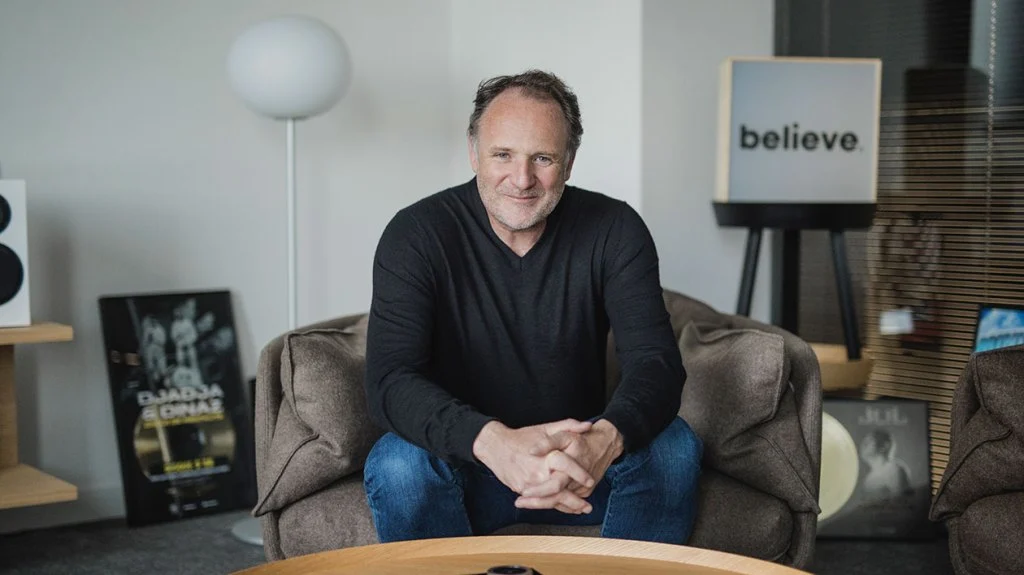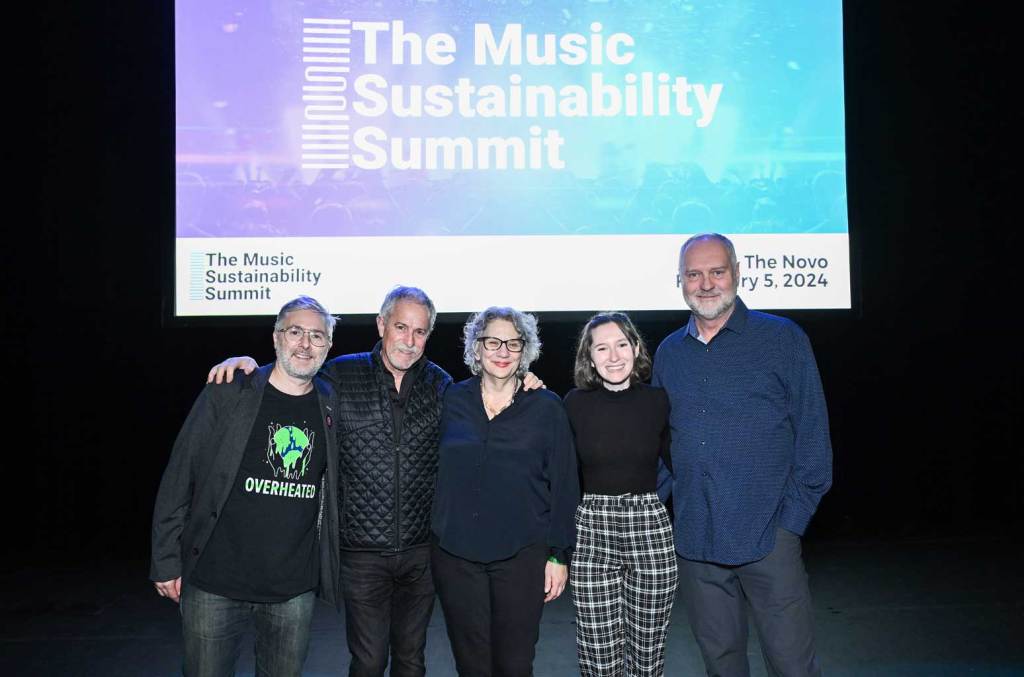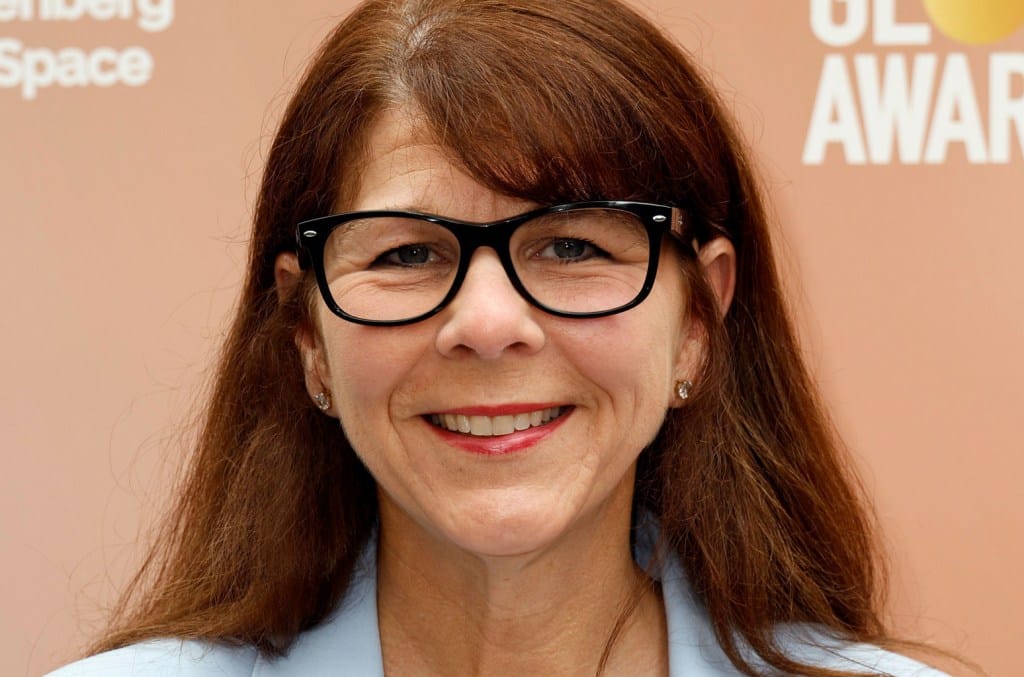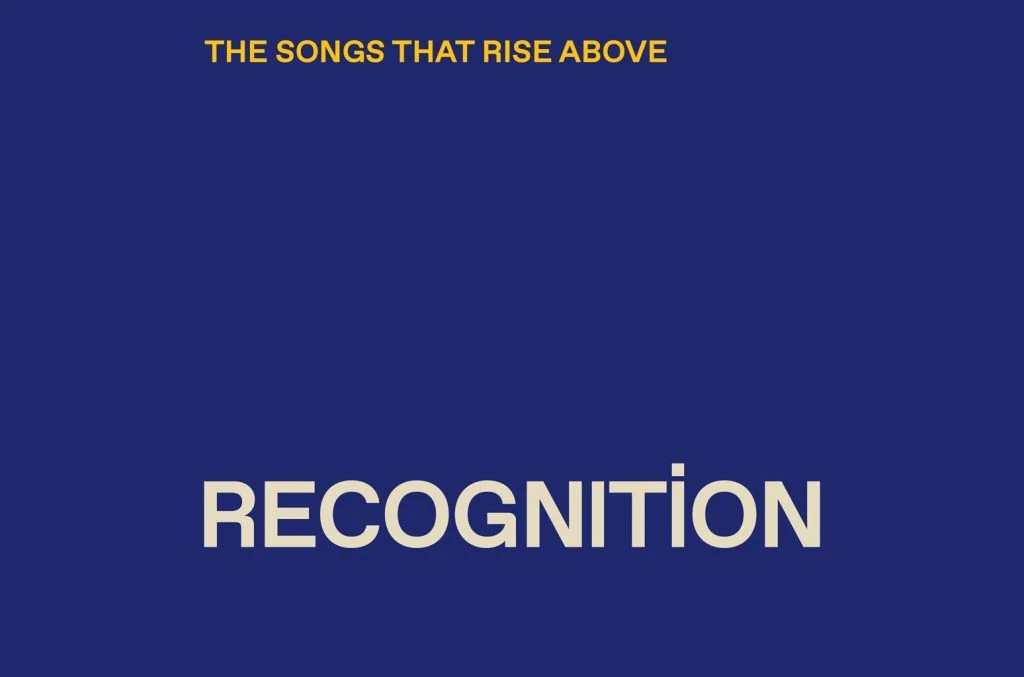Business News
Page: 32
Paris-based music company Believe delivered strong results in its first year as a privately held company. Full-year revenue rose 12.3% to 988.8 million euros ($1.05 billion), with 11.5% of organic growth, the company announced Thursday (March 13). Adjusted earnings before interest, taxes, depreciation and amortization (EBITDA), a common measure of profitability, improved 33.5% to 67.1 million euros ($71 million). Revenue had been up 14% at the year’s mid-point.
This year should be equally strong: Believe forecasts organic growth of 13.0% in 2025 despite “limited ad-funded streaming growth” and assuming “no significant subscription price increases” at large music streaming platforms.
Trending on Billboard
Believe’s major event of the year was a successful bid by a consortium formed by TCV funds, EQT X and CEO Denis Ladegaillerie to take the company private. The consortium owns 96.6% of Believe’s share capital, leaving the company with a small public float. After the deal was completed, Believe’s board of directors added a new director representing EQT X, former Shazam CEO Andrew Fisher. A director representing Ventech, which sold its shares to the consortium, departed the board.
The company was also active in acquiring, partnering on and launching new businesses last year. It debuted two new imprints in Asia in 2024: PlayCode in Japan and Krumulo in Indonesia. It also fully acquired Turkish record label DMC in August; launched EDM label All Night Long in partnership with artist management company Kidding Aside; acquired Indian record label White Hill Music; and formed a partnership with EDM company Global Records, in which Believe acquired a 25% stake in July.
Believe saw strong growth in both its premium solutions and automated solutions divisions. Premium solutions, which mainly consists of the sale and promotion of digital content for artists and labels, had revenue of 942.2 million euros ($997 million), up 12.0% year over year. Automated solutions fared even better, improving 17.0% to 64.6 million euros ($68 million).
Digital sales grew above 10% throughout the year. Non-digital sales, which includes music publisher Sentric Music Group, which Believe acquired in 2023, were strong until September but were hurt in the fourth quarter by accounting changes in publishing in automated solutions, which includes digital distributor TuneCore, and lower concert activity and physical sales in premium solutions.
In Believe’s home country and largest single market, France, revenues grew 10.3% to 162.9 million euros ($172 million). Non-digital sales in France fell in the fourth quarter due to a drop in concert activity. Germany, the company’s second-largest single market, was up just 0.4% to 111.3 million euros ($118 million). Non-digital sales in Germany fell due to Believe’s decision to accelerate its exit from contracts the company called “too heavily reliant on physical sales and merchandising.”
European revenues (excluding France and Germany) rose 23.3% while the Americas grew 18.0% to 151.2 million euros ($160 million), due in part to “significant progress” in the U.S. and the performance of TuneCore. Revenue growth in Asia Pacific and Africa was far softer at 3.5%, to 237 million euros ($251 million), due to weak ad-supported streaming revenues and foreign exchange changes. Paid streaming, while less valuable than ad-supported streaming in Asia Pacific and Africa, “remained solid” but was negatively impacted in India by the shutdown of the streaming platform Wynk.
Free Our Art, a new non-profit dedicated to safeguarding First Amendment creative freedoms for artists, has officially launched with widespread support from major arts advocacy groups and creative industry leaders.
The nonprofit focuses on the growing trend of creative works being used as confessions in court, advocating for state and federal legislation to limit this practice, supporting legal aid for defendants and funding research.
Free Our Art backs legislation establishing a single standard for admitting creative expression as evidence in court. The bipartisan federal Restoring Artistic Protection (RAP) Act was reintroduced in 2023, and states including Georgia, Maryland, Missouri and New York are considering similar bills. This follows cases where courts have overturned convictions due to prejudicial use of lyrics as evidence.
The movement began in the music industry, where artists have faced increasing legal scrutiny, particularly in hip-hop.
Trending on Billboard
Supporters include the Recording Academy, Black Music Action Coalition, Recording Industry Association of America, Songwriters of North America and SAG-AFTRA, among others. The organization’s leadership includes Harvey Mason jr., Julie Greenwald and Lyor Cohen, with advisory boards co-chaired by advocates and scholars including Dina LaPolt, Willie “Prophet” Stiggers, Dr. Erik Nielson and Lucius Outlaw III.
“RIAA is proud to stand with the creative community supporting free expression,” said Michele Ballantyne, president and COO of RIAA. “Free Our Art stands for responsible, balanced legislative approaches that protect the First Amendment and safeguard and encourage all forms of creative expression while allowing reasonable, limited use of artist works in court only where they are truly relevant and necessary and not being used to inflame and distort the process.”
Mason jr. added: “Music has always been a powerful tool for storytelling and self-expression, and unfairly silencing any genre or form of creativity is a violation against all music people. With the Free Our Art coalition, the Recording Academy will continue leading the fight to protect artists’ right to create freely, without fear of their work being criminalized.”
According to Free Our Art, scholars have documented nearly 700 cases where lyrics, primarily in hip-hop, were used in legal proceedings — with actual instances likely much higher. The group also cites a 2019 study at Arizona State University School of Law that found judges often fail to exclude creative works as character evidence, underscoring the need for legislative action.
Calling an artist’s right to create without fear “non-negotiable,” LaPolt, co-founder of SONA, said that “twisting creative expression into courtroom evidence isn’t just wrong—it’s a blatant attack on our First Amendment rights. This isn’t about one artist or one genre; it’s about protecting every creator from a dangerous legal precedent.”
The issue of lyrics being used in court gained renewed attention following the May 2022 indictment of rappers Young Thug and Gunna on RICO charges, where prosecutors cited song lyrics as evidence of gang affiliation. Young Thug received a 15-year probation sentence, while Gunna was released in December 2022 after pleading guilty to a gang-related charge.
Free Our Art aims to prevent similar cases from unfairly targeting artists based on their creative expression. More information on the organization’s efforts can be found here.
Avant Gardner revealed the new look for the Brooklyn Mirage today, releasing new renderings for the marquee dance venue that doubles as the inner courtyard for the 80,000-sq.-ft. live music compound in East Williamsburg. Closed in November to begin renovations, CEO Josh Wyatt says the new Brooklyn Mirage will keep its open sky outdoor aesthetic while expanding its dance floor from a 4,500-person capacity to 6,250 when it reopens May 1.
Wyatt, who has two decades of experience in nightlife, including management at the members-only social club NeueHouse, describes the bold new look of Brooklyn Mirage as “operatic grandeur” created as an “open air sanctuary” where “world-class artists and audiences unite” across a multilayered tapestry of light, sound and kinetic energy. Created by Avant Gardner’s in-house design and production team, in partnership with design studios Hard Feelings and Studio Greenbank, Brooklyn Mirage’s dance floor, elevated seating tiers and artist end stage all connect in a horseshoe-style configuration.
“It’s a huge dance floor, really, the largest in New York City,” Wyatt tells Billboard “And then when you’re looking at the overall structure, it’s three stories high and reveals itself as you traverse the structure through different sight lines and experiences. That’s something that the Mirage has always excelled at; providing these different moments from different perspectives within the venue.”
Trending on Billboard
The massive structure, which climbs up to 65 feet and its highest point, is built almost entirely from pre-manufactured and CNC-cut timber, making it one of the largest timber structures in the U.S. The 30k resolution wraparound LED wall features the first fully kinetic shutter system in live music, curtaining the length of the venue and giving artists full control over the venue’s comprehensive performance features. Brooklyn Mirage’s sound system is powered by L-Acoustics and includes more than 100 loud speakers and subwoofers strategically configuered for maximum sound balance and acoustic coverage. Brooklyn Mirage’s 90-foot stage is designed to accomodate modern touring shows, whether it be a global headliner DJ or a ten-piece rock group, with more than 20,000 tons of rigging capacity and seamless load-in and load-out.
Wyatt said his team has also made key upgrades to safety with new perimeter lighting, clear venue signage, and well lit and monitored rideshare drop-off zones. His team also invested in upgrading cell service at the venue to improve guest navigation and connectivity. Wyatt said the renovations were done with sustainability in mind, noting the facilities extensive use of pre-fabricated timber.
“Wood is a heck of a lot easier to engineer than other materials,” Wyatt said. “We have a commitment to sustainability and adaptive reuse and wanted to upcycle the wood components here. We felt that it would be a lot more friendly and like lower carbon footprint to be able to build it with predominantly with wood. Obviously, there are some steel elements but for building quickly and building efficiently, wood is more effective for engineering and for sustainability.”
More than 100 shows are confirmed to follow Brooklyn Mirages May 1 & 2 reopening with Sara Landry and upcoming shows from Cityfox (May 3), Cloonee (May 10), Empire of the Sun (May 21), two nights of Chainsmokers (May 22 & 23) and two nights of Excision (May 24-25).
For tickets and the latest event updates, visit Avant-Gardner.com.
The second annual Music Sustainability Summit has announced the speakers and agenda for the event that’s set to take place next month in Los Angeles. Topics to be discussed during the day-long gathering include: Live Music Emissions in the U.K. and U.S. Behind the Tracks: Music Production, Delivery, and Consumption Beyond Backlash: The High Stakes […]
Heavy metal legends Megadeth signed a deal with Frontiers Label Group’s new imprint, BLKIIBLK, to release the band’s forthcoming album globally. The deal was struck via frontman Dave Mustaine‘s Tradecraft imprint.
Global avant-pop star Sevdaliza signed a global deal with Create Music Group, which will release her upcoming music via its indie label, Broke, co-founded and led by Andre Benz and Brandon De Oliveira. The imprint put out Sevdaliza’s latest single, “Maria Magdalena,” on Friday (March 7). The first release under the deal was Sevdaliza and Karol G’s “No Me Cansare,” which came out in October and has more than 70 million streams globally, according to a press release.
Kristin Chenoweth signed with UTA for representation in all areas. Best known for originating the role of Glinda the Good Witch in Wicked and for starring in numerous films and TV shows, the Emmy- and Tony-winning singer and actress is set to debut in the forthcoming Broadway musical The Queen of Versailles in the 2025-26 season.
Trending on Billboard
Guitarist and songwriter Don Felder, best known for his former role as lead guitarist of the Eagles, signed with Frontiers Music Srl, which will release his debut solo album later this year. Felder is managed by Charlie Brusco at Red Light.
Seattle-formed alternative rock band Minus the Bear, which broke up in 2018 before reuniting, signed with Jordyn Reese at Do Better for Artists for management. The band’s label is Suicide Squeeze Records.
Mexican-Dominican songwriter Ambar Lucid signed with Nice Life Recording Company. The label released Lucid’s new song “There Goes My Baby” on Friday (March 7).
Country Latin artist Sammy Arriaga partnered with Chris Ruediger‘s Walk Off Entertainment for the release of his upcoming music, including new single “Left My Heart in Texas,” out Friday (March 14). The deal was struck via Arriaga’s own label, Dead Rose Records.
Boutique music publisher Maison Arts launched a full-service record label, Maison Records, with a roster that includes Swedish multi-instrumentalist Arc De Soleil, writer/producers-turned-artists Social House, Cuban electronic duo Pauza, London-based electronic duo Roi Turbo, DJ Devault, and U.K.-based Afrobeats artist Not3s. Maison Records’ executive team includes Maya Michaelian as head of marketing and A&Rs Livia Piomelli and Arielle Tindel. The Orchard will provide global distribution for the label.
Curb Records signed singer-songwriter and multi-instrumentalist Matthews to its roster. Matthews first found recognition as a lead vocalist and writer for Elevation Worship. He co-wrote and performed on several of the band’s songs, including “Here as in Heaven,” “Resurrecting” and “Echo,” and the group’s Here as In Heaven album. – Jessica Nicholson
Christian hip-hop duo West Indies signed with Rodney “Darkchild” Jerkins‘ Alienz Alive label. The duo’s self-titled debut project was released on Feb. 28.
Americana artist Connor Daly signed with Burning Ground Entertainment for management. Daly released his debut album, Colors Fade, in July. Daly, who counts Jason Isbell, Zach Bryan and Ed Sheeran as inspirations, recently released a new single, “Curtains Never Close.” Burning Ground Entertainment also represents artists including Mic Drop, The Pretty Wild, and Tayiha. – Jessica Nicholson
The landscape for top music executives remains overwhelmingly white and male, according to a new report by USC’s Annenberg Inclusion Initiative, which notes that representation at the highest levels of the music industry have remained minimal despite declarations of diversity, equity and inclusion (DEI) in by major music companies in 2020 — with many of them performing worse today than when data was last collected in 2021.
On Wednesday (March 12), Dr. Stacy L. Smith and the Annenberg Inclusion Initiative released their second Inclusion in the Music Business report — in partnership with Believe and Tunecore — that focuses on the gender and racial/ethnic identity of music executives, with data pulled from a survey of 2,793 executives across 106 music companies.
In one key finding, 86.8% of top executives (i.e. CEOs and presidents) at a smaller subset of 37 major and independent music companies were men, while 92.1% were white. All three non-white executives, two of whom were women of color, ran independent companies.
Trending on Billboard
“Much has been made of the ‘Year of the Woman’ in music, highlighting the work of artists like Taylor Swift, Beyoncé, Chappell Roan or Sabrina Carpenter,” the report reads. “While the music stage may be perceived as increasingly open to women artists, the executive ranks have maintained the status quo. Women fill fewer than 20% of top leadership positions and are still rarely part of senior leadership teams at top companies.”
“In comparison to 2021, there was no increase in the percentage of senior executives who were women, people of color, or women of color in these roles — in fact, the percentage of underrepresented top executives decreased,” the report adds.
In focusing on just six major music companies (Sony Music Entertainment, Universal Music Group, Warner Music Group, Spotify, iHeartMedia and SiriusXM), the report discovered that just a third of all senior management executives at those companies were women, while 16.7% were from an underrepresented racial/ethnic group. In total, there were just eight women of color working in those roles, amounting to 10.3%.
In a broader analysis of senior leaders across the 106 companies — boiled down to 77 companies when taking into account subsidiaries — men held 84.4% of CEO/president roles while women held just 15.6%. The majority of those top executives (82.2%) were white, while just 17.8% were from underrepresented groups. Women of color held just 4.4% of these top roles.
According to the report, among all companies surveyed, the presence of women executives falls significantly as the level of responsibility increases. Across the executive hierarchy categories of chief/president, executive vp/senior vp/GM and vp/head, women are most likely to hold positions at the vp/head level at 43.9%. This percentage drops to 38.1% of executive vp/senior vp/GM roles, while the percentage falls further, to 25.6%, at the chief/president position.
A similar pattern is found for underrepresented executives, who make up 25.9% of vp/head roles but only 19.7% and 21% of executive vp/senior vp/GM and chief/president roles, respectively. Only 10% of all executives in these categories were women of color.
The report suggests that the lack of female representation in higher roles could be due to two primary consequences of gendered leadership beliefs. “The first is that [women] may not be projected into leadership positions because they are not perceived to have the traditionally masculine traits associated with leadership,” the report reads. “The second is that when women do behave in ways that violate their gender role, perhaps by exhibiting leader-like behavior, they are punished. Thus women may be excluded from promotions for reasons that are not based on their actual performance but on gender role expectations that still play a role in how they are evaluated.”
Dr. Smith and her team (which includes report authors Dr. Katherine Pieper, Zoe Moore and Sam Wheeler) also broke the findings down by five sectors: music groups, record labels, publishing, streaming and music distribution.
The music distribution sector has the highest percentage of women executives (47.8%), which is significantly greater than the other four company types, none of which reached 40%. Women fill 39.4% of executive positions at record labels, 38.3% at music groups, 37.6% in publishing and 37.2% at streaming companies.
Alternatively, record labels are a leader in underrepresented executives, who make up 30.1% of executive roles at labels. That percentage still lags behind proportional representation with the U.S. population (at 41.6% underrepresented, according to U.S. Census data) but is better than music groups (25.1%), music distribution (23.1%), streaming (17.9%) and publishing companies (16.3%). “Compared to the 2021 analysis, the current landscape shows a significant decline in the representation of underrepresented executives within the streaming sector,” the report reads. “There were no meaningful changes for the other industry categories.”
A closer look at women of color in executive roles indicates that record labels (13.4%) were significantly more likely than streaming (7.5%) and publishing (6.9%) companies to be inclusive of underrepresented women in leadership. Music groups (11.8%) and music distribution companies (9.9%) held a middle position.
“The lack of underrepresented executives in key leadership roles is particularly disappointing because in recent years, finding ways to promote talented people of color has been a priority for the industry,” the report states. “Efforts to address ongoing gaps have included the launch of industry-wide coalitions, task forces, and company-specific plans. Despite this, the underlying biases that thwart hiring and promotion have clearly not been addressed. To see more underrepresented leaders in the music industry, valuing the abilities, insights, and leadership traits that people of color bring to these roles is essential.”
For women of color, the hurdles to reach the top echelons of the music industry remain the highest. Among the smaller subset of 37 music companies, a mere 5.3% of the highest-ranked executives and 10.3% of senior management teams are composed of women of color.
“The lack of women of color in leadership roles stands in contrast to the strong showing of women of color as artists and songwriters over the past several years,” the report states. “Clearly the music industry values women of color — but not the ways that women of color lead.”
The report offers three actionable opportunities for change. First, it recommends using specific and measurable criteria in the hiring, evaluation and promotion process. Second is to create pathways to promotion that account for the different experiences needed to lead well while ensuring that performance metrics are met. The third is to pursue solutions that are sector-driven.
“The music industry has faced a difficult season with layoffs across multiple companies,” the report states. “Additionally, the wider cultural moment is dismissive or even hostile to so-called DEI initiatives, creating wariness or even abandonment of principles and activities designed to cultivate and foster talent. Despite these challenges, the music business need not forego adopting strategies that will allow for the most qualified employees to rise to positions of greater responsibility and leadership, no matter their identity.”
Check out the full report, including additional information on solutions, here.
Multimedia company REVOLT is staking its claim in the music distribution arena with the launch of 440 Artists. Described as more than a conventional distribution platform, 440 Artists pledges to “redefine independence for the next generation of artists,” says REVOLT. And it will do so by providing artists with an array of resources including global distribution, creative freedom and full ownership of their work plus a 90/10 majority share of their royalties.
440 Artists will also provide exclusive access to REVOLT’s media network: linear and digital TV programming, a full-scale marketing agency, high-impact live events and state-of-the-art production studios. Beyond providing distribution to over 250 DSPs, 440’s offerings range from real-time analytics and release support to opportunities for sync deals, brand partnerships and live performances.
In explaining the reason behind establishing 440 Artists, REVOLT CEO Detavio Samuels tells Billboard, “The independent music game is crowded, but the system is still broken. Artists have more ways to distribute their music than ever, but distribution alone doesn’t build careers. Getting on DSPs is just step one — breaking through takes real visibility, opportunity and strategy.”
Trending on Billboard
Akinwole Garrett, REVOLT’s vp of business development, adds, “With the recent shift towards artists wanting to remain independent and forgo label deals, we saw a great opportunity for REVOLT to expand its impact. The natural next step was to marry our deep-rooted connection to hip-hop with a platform that truly empowers independent artists — giving them the visibility, industry access and financial opportunities they deserve.”
Detavio Samuels
Courtesy of REVOLT
Cena Zarin, head of music programming & talent relations for REVOLT Media & TV, and Mike Brown, senior administrative coordinator to REVOLT’s CEO and CBO, also played instrumental roles in developing and shaping 440 Artists. “Without their leadership and vision,” says Garrett, “440 Artists wouldn’t exist.”
The launch of 440 Artists will be officially celebrated at REVOLT House tomorrow (March 13) during SXSW 2025. Being held at Vulcan Gas Company in Austin, REVOLT House will feature performances from rising artists such as LaRussell, 310babii, Zeddy Will, K Carbon, Lebra Jolie, Lex Bratcher, Luke Bar$ and WhoKilledKenny. Also on tap: a live showcase of the REVOLT Podcast Network and interactive fan activations.
Samuels and Garrett share further insight below about 440 Artists, whose moniker was inspired by the audio frequency 440 Hz — the universal tuning frequency in music. For additional information about 440 Artists, visit the website.
What else prompted the decision to expand into distribution?
Samuels: We created 440 Artists not just to distribute music, but to plug artists into the full power of REVOLT’s ecosystem. Other platforms stop at distribution. We take it further. No other distribution service is backed by a global media brand with the ability to push artists through a multiplatform, multi-format ecosystem, showcase them on major stages and connect them with brands investing in culture.
Garrett: What started as a move to uplift hip-hop artists has now expanded into a much broader ecosystem — one that supports multiple categories and sub-genres, ensuring that independent talent across the board can grow, break through and succeed on their own terms. Despite the industry’s many players, we bring a unique approach and exclusive opportunities to artists that they can’t find under one roof. As the largest Black-owned media business in the country, with a fully staffed sales team, we offer countless opportunities to integrate 440’s artists into national brand campaigns. Moreover, beyond music videos and performances, we will create additional content opportunities — including podcasts, scripted and unscripted film and television projects, and digital content— to expand an artist’s presence across the media and entertainment landscape.
Akinwole Garrett
Courtesy of REVOLT
What’s the criteria for being selected to join 440 Artists?
Garrett: We seek artists who are talented, driven, and recognize the unique value that REVOLT and 440 bring to the table. Beyond an artist’s streaming performance, physical sales, and other metrics, we prioritize those with a loyal and engaged audience — regardless of size — who have a compelling persona that we believe 440 can elevate to the next level.
Last June, REVOLT became an employee-owned company. How does 440 Artists fit into your overall business model?
Garrett: REVOLT’s employees will play an active role in the success of 440. As majority owners, they will serve as A&Rs within their own networks, engaging with independent artists and making recommendations for those who could be a great fit for the 440 platform. 440 is also a core component of REVOLT’s broader creator strategy and platform. As the creator economy continues to expand and diversify, REVOLT has already established its presence across multiple verticals: working with YouTube creators through the YouTube Creator Network, podcasters via the REVOLT Podcast Network and digital publishers through the REVOLT Publisher Network. 440 Artists serves as the fourth pillar of this ecosystem, collectively forming the REVOLT Creator Network (RCN).
Samuels: 440 Artists embodies what REVOLT stands for: empowering creators and shifting ownership back to the culture. But this wasn’t my idea. 440 is 100% employee-driven. A group of employees saw a gap in the industry, created the vision, designed it and built it from the ground up. Now they get to see their idea come to life in the real world. It wasn’t on my vision board, but it was on theirs. And that’s exactly why we’re doing it.
Hipgnosis, the catalog company with rights to songs by artists including the Red Hot Chili Peppers that became the face of music-as-an-asset-class for Wall Street investors, is being renamed Recognition Music Group, the company said on Wednesday (March 12).
The new name covers what was previously three separate companies that each had Hipgnosis in the name: Hipgnosis Songs Fund, a publicly traded music royalty investment fund formerly listed on the London Stock Exchange; Hipgnosis Songs Assets, a privately-held royalty fund backed by Blackstone; and Hipgnosis Song Management, the investment manager previously run by founder Merck Mercuriadis that worked to generate a return on the song rights held in the catalog funds.
Mercuriadis did not respond to a request for comment.
Trending on Billboard
Since Blackstone acquired Hipgnosis’s public fund for $1.47 billion and Mercuriadis stepped down from his role as chair of the investment manager last year, the company decided it was time to shed the old name, CEO Ben Katovsky tells Billboard.
Recognition’s portfolio of publishing and master recording rights to some 45,000 songs include stakes in megahits like Shakira‘s “Whenever, Whereever,” The B-52s’ “Love Shack,” Fleetwood Mac‘s “Go Your Own Way” and Diana Ross‘ “I’m coming out.” A video made by the company to promote its new name to its roughly 40 employees weaves together lyrics from these and other songs in its portfolio to send a message that despite their history as separate entities, the Hipgnosis companies are meant to “get together,” even if one almost went its “own way” during Blackstone’s billion-dollar bidding war with Concord. Nearly a year after it consolidated ownership, Blackstone and Katovsky “want the world to know” this is a new company.
“It’s impossible not to have those songs resonate in your mind,” Katovsky says from Recognition’s London offices. He tells Billboard that the new name refers to “a combination of how easy it is to recognize those songs day to day and also to recognize the talent of the artists and songwriters and musicians who made those songs.”
Qasim Abbas, Blackstone’s head of tactical opportunities international, the division of the global financial fund that owns Recognition, said in a statement that last year showed “strong investor conviction in this asset class.”
“The company is now set to build on its position as a leading independent investor in music rights; owning and managing an incredible portfolio of songs and recordings,” Abbas added.
Hipgnosis was known for acquiring dozens of catalogs a year between 2018 and 2021, earning it a reputation of contributing to a run-up in the market for music royalties. In contrast, Recognition intends to be a “selective buyer” of music rights, Katovsky says.
“Our ambition is to continue to grow the portfolio, and we already have scale as a business,” Katovsky says. “The scale allows us to invest … but it also means we’re not under any pressure to deploy capital.”
Recognition’s portfolio remains heavily weighted to publishing rights, which comprise roughly 80% of its assets; the remainder are mostly master recording rights. Blackstone still owns Hipgnosis Songs Group, the subsidiary that has housed Big Deal Music’s administration business since Hipgnosis acquired the independent publisher in 2020. The company has said the division is under strategic review, and Recognition is now looking to partner with publishers and music companies for the administration of its assets.
“Recognition Music will be a very collaborative player in this space in ways that it was not historically,” Katovsky says. “We want to work with other partners in this industry to do that.”
Concord is an advanced talks to acquire music distributor Stem, according to multiple sources close to the talks.
Los Angeles-based Stem is a 10-year-old digital distributor that gives independent artists ownership of their works and retains a distribution fee. Nashville-based Concord has vast music publishing and recorded music catalogs that include the compositions of Rodgers & Hammerstein, classical music publishing company Boosey & Hawkes, and the catalog of Round Hill Music, which it purchased in 2023 for $469 million.
Financial terms are unknown, but a report at Music Business Worldwide claims the deal could reach $50 million. The Hollywood Reporter cites sources as saying that figure “is wildly inaccurate” and that negotiations could result in a partial sale.
Stem would help Concord in its ambition to develop its frontline business. While Concord’s annual revenue is split roughly 50-50 between its publishing and recorded music divisions, it has notched more publishing hits, such as Miley Cyrus’ “Flowers,” which Concord owns a piece of through Tyler Johnson’s co-writing credit. In September, Concord merged its Concord Records and Fantasy Records into a single label, naming Margi Cheske and Mark Williams as co-presidents.
Trending on Billboard
Concord’s frontline record label business includes Rounder Records, Concord Jazz, Fearless Records, Concord Theatrical Recordings and the Kidz Bop franchise. Concord also has joint ventures in Loma Vista Recordings with Tom Whalley; Easy Eye Sound with Dan Auerbach; and PULSE Records with PULSE Music Group. Launched in 2023, PULSE Records saw major success with Tommy Richman’s 2024 hit “Million Dollar Baby.” Billboard estimates the song generated $4.99 million from on-demand audio streams and digital song sales, based on Luminate data.
Stem, which raised $40 million in three fundraising rounds from 2017 to 2022, has been looking for a strategic investor since at least last year to give it access to more funding for artist advances after losing a series of stars to major labels. Competition for artists seeking distribution deals had picked up enough that Stem “lost numerous deals historically as it wasn’t able to be competitive with advances,” according to a Stem pitch deck Billboard obtained in 2024.
In 2023, Stem secured a $250 million credit facility from Victory Park Capital to expand its advance check product, which has funded projects by Brent Faiyaz and Justine Skye. That line of credit was “restrictive,” a source with knowledge of the company tells Billboard, because it was doled out on a deal-by-deal basis, requiring each artist’s project to recoup its own advance. Lewis says a better option is to borrow against the whole company’s balance sheet so that if one artist’s project flops, the loan can be repaid by a successful one.
“Music is a hit-driven business, and you need to have capital that understands that and is willing to allow you to take the risk across multiple projects, knowing that the overall portfolio will perform,” this person says.
It was for that reason that Stem was looking for equity investors rather than debt. Outside investors, many from the venture capital world, already own a majority of Stem’s equity. Stem’s decision to provide artists with advances came at a time when interest rates were lower than they are today, and one industry source speculates that rising interest rates were a pressing matter for Stem. Concord would likely be able to provide Stem with a lower cost of capital, this source tells Billboard. Concord has raised more than $3 billion from three asset-backed securities led by Apollo Global Management.
Warner Music Group (WMG) has also been in the market for a distribution company, having passed on an opportunity to acquire TuneCore owner Believe in 2024. But speaking at a Morgan Stanley conference on Monday (March 11), WMG CEO Robert Kyncl suggested the company could build rather than buy a distributor at the going rates. “I’ve looked at all distribution companies over the last 18 months … and what I can tell you is that we’re not willing to grow this at all costs,” Kyncl said.
The Abbey Road Institute is set to launch its newest campus in Los Angeles this summer, it was announced Tuesday (March 11). The state-of-the-art facility will be led by Grammy-winning engineer, mixer, producer and musician Rafa Sardina.
Designed to provide students with a unique professional experience, the West Coast campus will feature the institute’s renowned curriculum along with a faculty of Los Angeles-based producers, engineers and musicians, including Alan Meyerson, Barry Rudolph, John Boylan and Vanessa Garde.
“Abbey Road Institute Los Angeles is the culmination of a long-held dream,” said Sardina — who has worked with Stevie Wonder, Rosalia, Alejandro Sanz, Dr. Dre, Camila Cabello, Lady Gaga and more — in a statement. “I want to share the invaluable professional experiences of my closest musical colleagues and myself with outstanding new generations of mixers, producers, and other music and music business professionals. I can’t wait to welcome our first students and witness the beginning of their exciting career journeys.”
Trending on Billboard
Luca Barassi, CEO of Abbey Road Institute London, added: “We are thrilled to be working with Rafa and his team as we continue expanding our educational footprint in the U.S. Rafa has a strong affinity with how we teach, and an ambition to pass on his expertise to the next generation. Establishing our second U.S. campus in Los Angeles — a creative, dynamic, and globally influential city — will provide students with an immersive experience at the heart of a thriving international music scene.”
The program offers intensive and immersive education in a small, focused-learning environment, emphasizing hands-on, apprenticeship-style training to equip graduates with the skills necessary to thrive in the music industry. Graduates will earn a diploma in music production and sound engineering. Additional diplomas in audio post-production for film and TV & music business will be offered in the future.
“We are incredibly proud of the success of Abbey Road Institute graduates,” Universal Music Group COO and Abbey Road board member David Sharpe added. “Some of them have earned multiple Grammy and Billboard awards, along with numerous Grammy and Latin Grammy nominations. Bringing Abbey Road Institute’s world-class education to Los Angeles will provide aspiring producers and engineers with the training they need to make a strong entrance into the music industry.”
The campus’ exact inauguration date and location will be announced soon.

 State Champ Radio
State Champ Radio 










